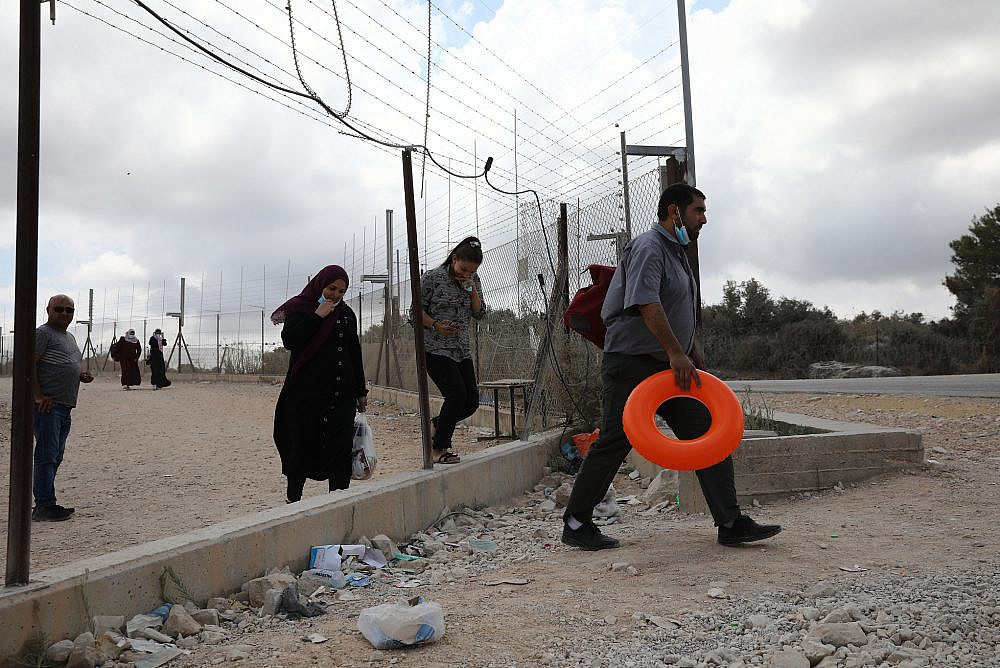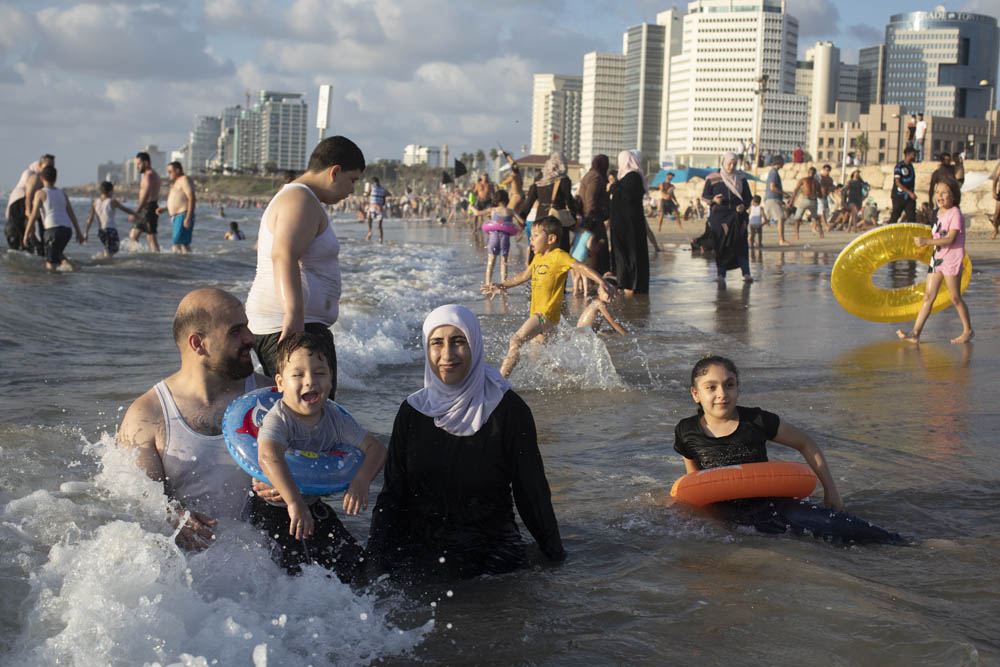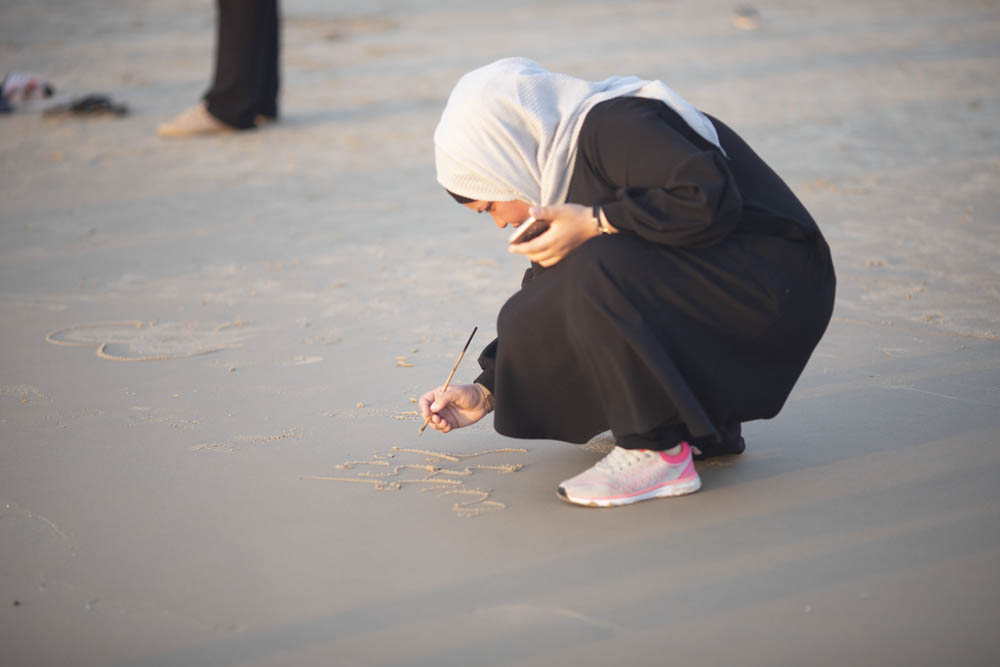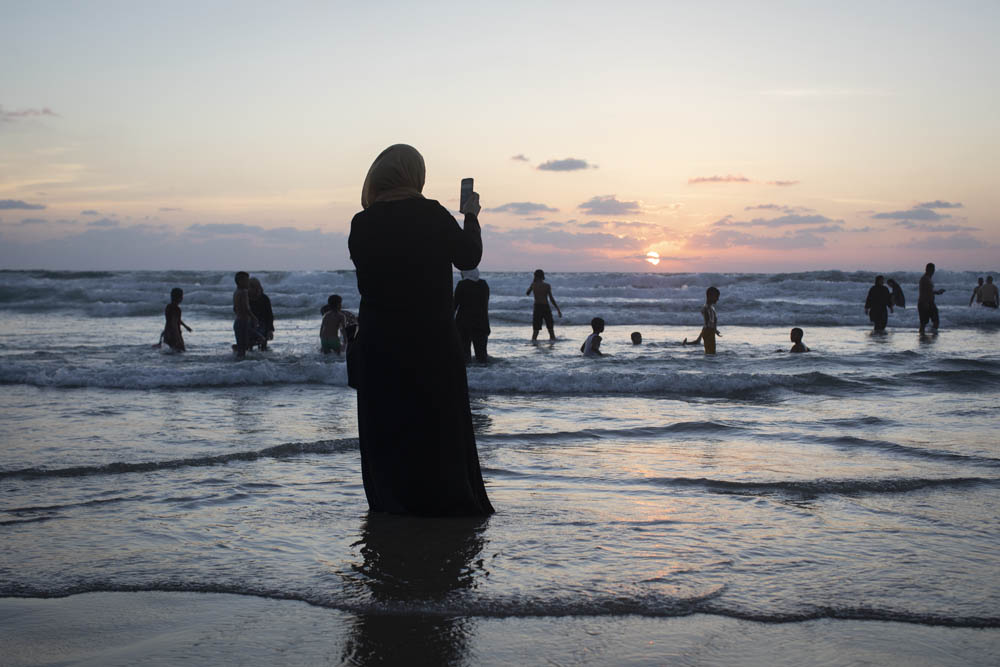In the past two weeks, tens of thousands of West Bank Palestinians have been freely traveling to cities and towns beyond the Green Line via holes in the Israeli separation barrier — with most of them headed for the beach.
These mass crossings, which have been taking place as Israeli soldiers look on, coincided with the four-day Muslim holiday of Eid al-Adha that began on July 30. Each year, Palestinians marking the occasion apply for rare holiday permits, which the Israeli Defense Ministry sometimes issues under limited conditions.
Israel did not issue holiday permits this year ostensibly due to the COVID-19 crisis, but the breach in the separation barrier meant that Palestinians were still able to go to the coast — usually off-limits to them — to mark the holiday.
The gaps in the barrier are located primarily along the center-north of the West Bank, although some are also found near Hebron and Modi’in. One of the main crossing points is next to the West Bank village of Far’oun, west of Tulkarem, where at least two three-meter-wide holes are being used by local travelers.
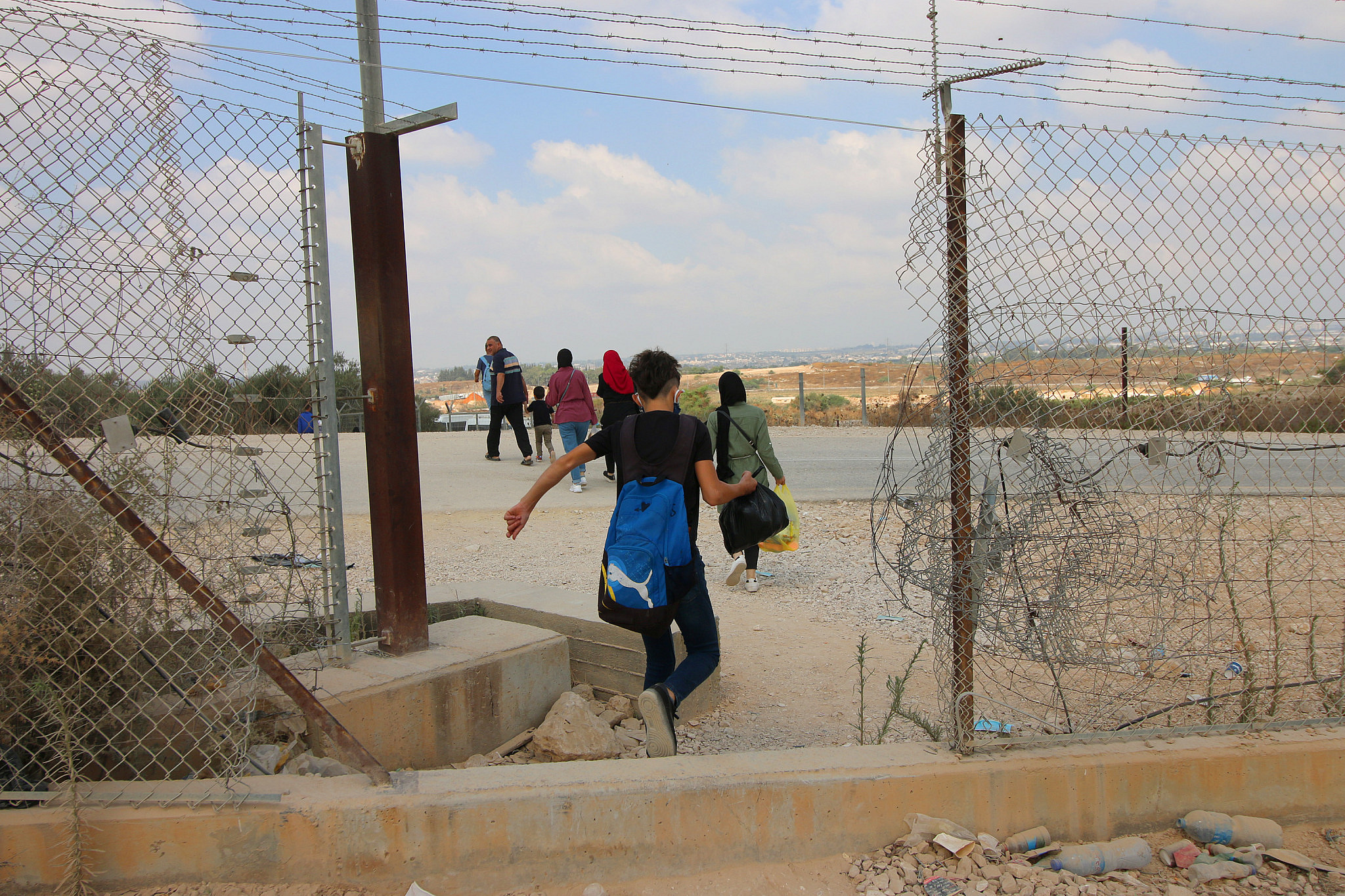
Last Wednesday, when +972 visited that section of the fence, which is fully equipped with motion sensors and CCTV cameras, Palestinians were quietly and safely crossing under the eyes of two Israeli soldiers who were monitoring the area. +972 observed three Israeli military jeeps drive past the gaps without stopping Palestinians from crossing.
Dozens of bus drivers on the Israeli side of the barrier called out to Palestinians making their way over, offering to drive them to Haifa, Jaffa, and Acre. Opposite to them were drivers offering rides back to the West Bank cities of Nablus and Tulkarem, in addition to some vendors who were selling their wares at the crowded crossing point.
This morning, the Israeli army sealed the barrier hole at Far’oun with barbed wire and shot tear gas at nearby Palestinians who were trying to cross. The travelers, however, moved instead to other open breaches further down the barrier.
‘What permit can I get?’
Palestinians have been subject to ever-changing restrictions on movement since Israel’s establishment in 1948 — first under the military government inside the Green Line over Palestinian citizens of Israel, which lasted until 1966, and then under the occupation in the West Bank and Gaza Strip.
These restrictions were significantly expanded following the signing of the Oslo Accords in the 1990s and the construction of the Israeli separation wall that began in the 2000s. While West Bank Palestinians with permits are usually required to cross through certain checkpoints for Palestinians only, Israeli citizens travel freely through Israeli-only Green Line checkpoints with no permits and little inspection.
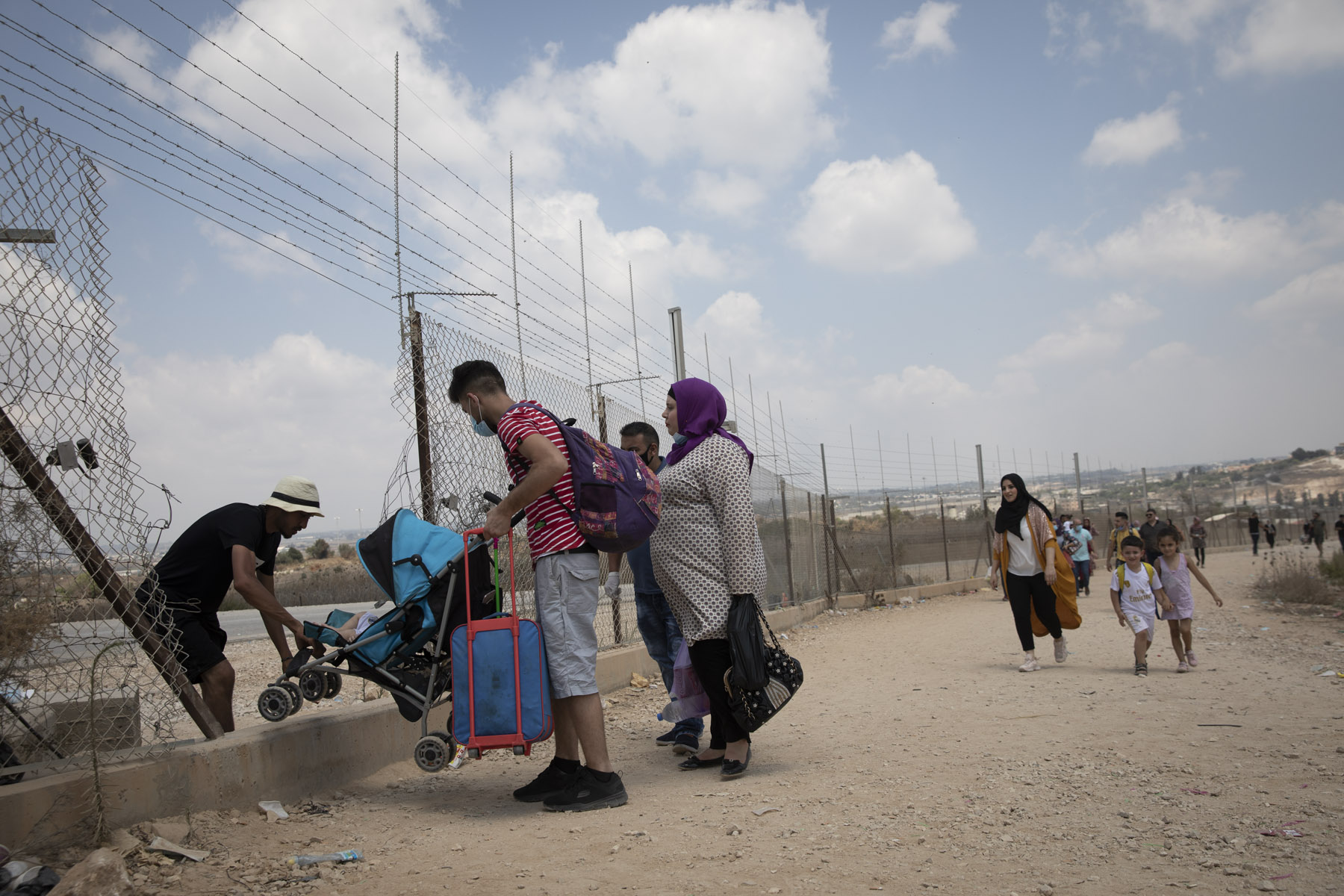
“I’m visiting Jaffa for the first time since 1999,” said K. J., who asked to remain anonymous for his personal safety, and who was traveling with his wife and two daughters. He added that he has been unable to travel beyond the Green Line or internationally due to a “security ban” imposed on his family by the Israeli authorities. “This hole is a rare chance to visit 1948 territory [inside the Green Line].”
Israel’s permit system, administered by the Defense Ministry, bars Palestinian men under the age of 50 and women under the age of 45 from crossing the Green Line without a permit. Anyone younger must apply for a specific purpose, such as work and medical treatment.
Some Palestinians crossing through the barrier holes said they do not qualify for permits under Israel’s strict regime. “I’m young and unmarried. What permit can I get?” M. A. said, noting that he was never granted a travel permit.
On Monday afternoon, hundreds of Palestinians were continuing to cross the barrier in the Tulkarem area. In the morning, Israeli soldiers stationed in Far’oun fired tear gas at those trying to get through, but later on people continued to cross without interference.
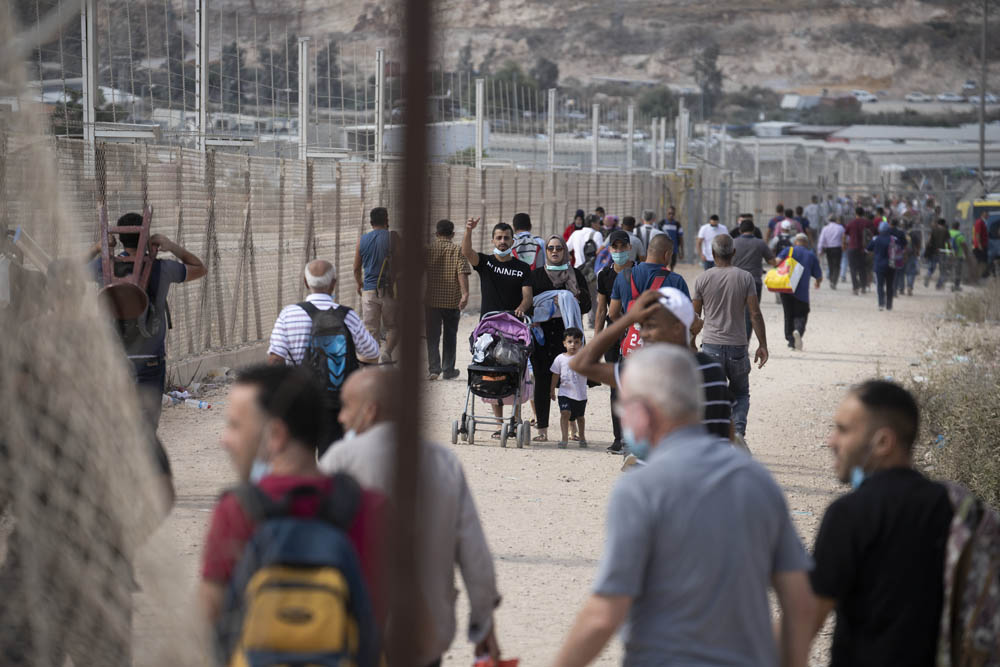
Israeli military police detained and sent back dozens of Palestinians trying to cross the barrier between Zeita, a Palestinian village in the Tulkarem area, and Jatt, a Palestinian town in Israel. One of the detained said that he had entered Israel with a permit, but wanted to go back via that crossing point. “We’re allowed to return from wherever we want,” he said.
Salah, another Palestinian who was detained, told +972 while he was being taken to a military jeep: “If they don’t want us to enter, why are they opening the fence? Either they close the gaps or they stop interfering when we enter [Israel] to go to work or to the beach.” A soldier replied: “It’s a fence, why are you crossing it all of a sudden? You can’t cross here.”
Who created the hole?
According to the Palestinian residents of Far’oun, the hole in the barrier, as with many others like it, was originally created by smugglers who bring Palestinian day-laborers inside the Green Line. This breach has been a long-running source of conflict between the Israeli military and Palestinian laborers, “which sometimes ended up with raids in my village and even open fire toward workers”, said Khaled Badir, a Palestinian journalist based in Far’oun.
According to Badir, more people started using the holes in the barrier as a result of the COVID-19 crisis and ensuing restrictions imposed on laborers with permits — but the IDF did not do anything to stem the growing usage. “We started noticing that the army is implicitly allowing workers to cross by not being present at the fence during the commuting hours,” he said.

This is the first time Badir has witnessed Israeli soldiers effectively turning a blind eye to Palestinians crossing into Israel via the barrier breach. “I’m sure this is a senior military decision. But I don’t understand the reasoning behind it,” he said.
In early August, during Eid, the hole at Far’oun became increasingly busy as Palestinians on social media were informed about the rare opportunity to cross the barrier. There were mixed reactions to those taking advantage of the breach: even as some encouraged their friends to visit places usually off-limits to them, others criticized breaking the COVID-19 lockdown imposed by the Palestinian Authority during Eid.
The PA has yet to release an official statement about the movement at Far’oun. However, Palestinian media reported that the PA’s Health Minister, Mai Kaileh, highlighted the “health risk” of traveling to “’48 areas” due to the high number of COVID-19 cases among Israelis.
Meanwhile, Bashar Masri, a Palestinian entrepreneur and businessman, called on the PA to reconsider their current COVID-19 protocols, arguing that they “caused an economic depression in the Palestinian market… after the occupation suddenly opened the checkpoints, which prompted people to travel for recreation and shopping [in Israeli markets].”
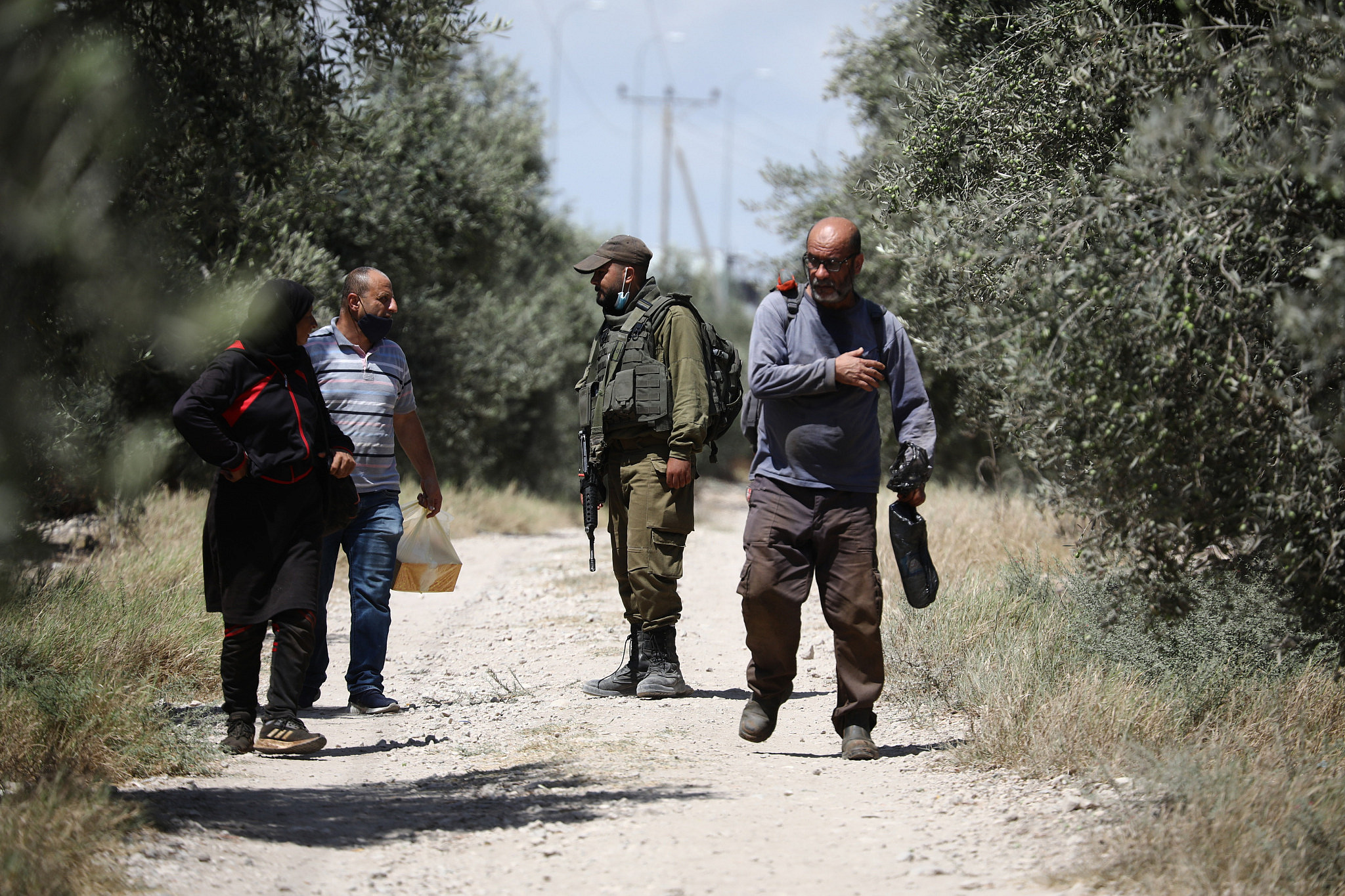
But Masri’s statement, and others like it, have sparked a huge backlash from Palestinians who have urged their peers “to travel and see their towns from which they were expelled in 1948.” In response, some Palestinians have posted Facebook stories in which visitors are seen singing Palestinian liberation songs, while others have posted photos of their refugee relatives visiting, for the first time in ages, the hometowns from which they were displaced.
‘If only we could enter all the time’
A few dozen miles away, along the Jaffa-Tel Aviv shoreline, thousands of Palestinians enjoyed themselves at the beach, with some staying until night-time. Those who had traveled from the West Bank were easily identifiable, insisting on staying in the water even after the lifeguards had gone home for the day. Many of them filmed live social media broadcasts for their families at home.
Osama, 43, from Nablus, who was at the beach in Jaffa with his wife and children, had not seen the sea in 34 years. His family was visiting it for the first time.
“It’s an incredible feeling,” he said. “My grandfather was originally from Jaffa, from Kufr Salame. He packed oranges for a living, and was expelled during the Nakba.”
Osama added that he wasn’t sure whether it was for political or economic reasons that they were being allowed to cross the Green Line, but that didn’t interfere with his enjoyment of the opportunity. “I hope to be able to come back, but who knows what will happen tomorrow,” he said.
Rashid, 16, from Deir Abu Mash’al near Ramallah, recounted how he and his friends crossed into Israel via the breach near the village of Ni’lin without being stopped by soldiers.
“This is the second time in my life I’ve gone to the sea,” he said. “I’m really happy. If only we could enter all the time.”
Alaa, a public relations undergraduate from Nablus, traveled to the beach with friends, with whom she was collecting shells and writing words in the sand. “I’m excited to be here,” she said. “I wasn’t afraid to cross the barrier.”
Basel, 42, from Qalqilya, said he had never been to the beach before. He was accompanied by his wife and three children, who stayed in the sea after the sun had gone down. “We’ve been locked down for five months because of the coronavirus, in isolation at home. We had to go out and get some air,” Basel said. “People are unemployed. It’s better for [the fence] to be open, so people can work and visit. It’s better than dying imprisoned indoors.”
The Allenby crossing from the West Bank into Jordan is also under new restrictions due to the coronavirus pandemic, leaving Palestinians feeling even more cooped up than usual.
Basel found it difficult to describe his impressions of Jaffa. “It really is the bride of the sea, as they say. After the beach we’ll go to the [famous Jaffa restaurant] The Old Man and the Sea, which I’ve heard is excellent.” Although the trip was expensive, given his unemployment, Basel said he intended to make a return visit next month.
“I’ve come here three times in the past week,” said a young man from Jayyous, next to Qalqilya. “It’s been five years since I last went to the beach.”
The scenes at the beach in Jaffa were a reminder of how close the West Bank is to the shoreline, and of what a relatively “normal” situation — with no separation — could look like.
‘If it were a real border, do you think they’d let people across?’
“This week, the border between Israel and the West Bank was almost completely erased,” an Israeli journalist tweeted on Saturday. That was indeed the impression at the separation barrier and at the beach. Many people remarked that there were no soldiers present at the various points through which they crossed into Israel, or if there were, the soldiers simply observed from a distance.
A 50-year-old man from Bethlehem, who with his wife and daughter traveled to Far’oun then Jaffa, said: “The situation in the West Bank is at breaking point. There’s pressure, and having the fence open is allowing people to breathe a little, to enjoy the beach.”
Even though Eid ended last week, the flow of visitors to the beach continued through the weekend and into this week. Although it remains unclear as to how long this unofficial policy will last, Israeli media has been relatively indifferent to the affair, with some noting that the situation poses little security or health risk. There were even ironic comments about how, in the absence of tourists from abroad, there were at least Palestinian visitors from the West Bank.
There have been various speculations as to why Palestinians are being allowed to cross into Israel via gaps in the security fence, with one theory being that it represents a show of authority by Israel.
“The reason everything is open is political,” said a driver from Taybeh waiting for passengers. “[Israel] wants to show who’s in charge, and to weaken the PA. When the PA introduces a lockdown, Israel opens everything up.”
A 60-year-old Palestinian man standing next to one of the breaches in the fence offered a similar explanation. “They want to show that there’s no Israel and no Palestine, just a single territory. They’re preparing to annex the whole West Bank. If it were a real border, do you think they’d let people across? They want to erase the border.”
“They barred us from coming in, but I’m going to Palestine,” said another man who was crossing the fence with his family. “We’ve been waiting decades for [the border] to open, and now we can freely go to the beach.”
The IDF Spokesperson said that they were not addressing the matter of the movement of Palestinians through breaches in the separation barrier.
This article was first published in Hebrew on Local Call. Read it here.

